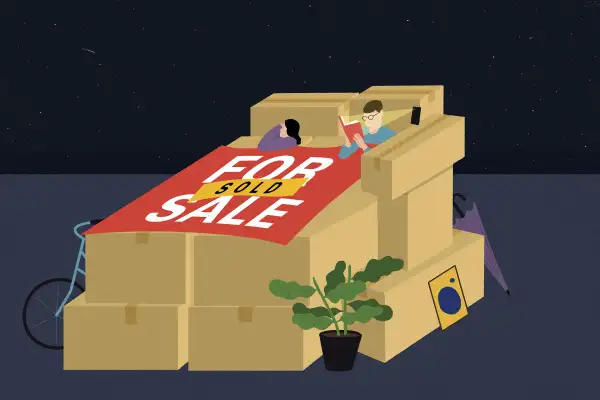Lightning-Fast Home Sales Are Leaving Sellers Stranded

When Kari and Thor Torstenson’s Charlotte, N.C. home sold in less than 24 hours, they had mixed emotions.
Of course, they were thrilled that the fixer-upper they’d poured four years of work into sold quickly — not to mention for $45,000 above asking price. What wasn’t so great, though? They hadn’t found a replacement home yet.
“It’s definitely an uneasy feeling — especially given that we have two children under the age of three,” Kari says.
Though the couple has made offers on several homes (including one not even on the market yet), they’ve yet to snag a new property since their home went under contract in March. As Kari puts it, “The market is very competitive.”
It’s true — and not just in Charlotte. Over in Rochester, N.Y., Lindsay Cray sold her home in a mere six days. Like the Torstensons, she hasn’t been able to find her next house either.
“Selling your home can be lucrative right now, but this market makes you feel as if it’s impossible to find another one,” Cray says.
Such stories are hardly unique in today’s competitive real estate landscape. With housing inventory at record lows and buyer demand strong, the few properties available are selling at warp speed — and often for well above asking price.
Competition for houses is stiff
According to real estate brokerage Redfin, right now nearly 60% of homes are going under contract within just two weeks, and 46% are sold in seven days or less. On top of that? Nearly half sell for more than asking price, the highest share on record.
While the latter is certainly good news for sellers on the front-end, it also leaves many in a lurch — elated with the fast, profitable sale of their home but unable to find a new home quick enough (or in their price range) to replace it.
“One of the toughest aspects of selling a home in a hot market is what's next after the home sells,” says Matt Van Winkle, owner of RE/MAX Northwest in Seattle. “Timing a purchase and sale is incredibly difficult in most markets but especially when most sellers won't accept an offer contingent on the sale of the buyer's home.”
Contingencies are clauses in a sale contract that allow the buyer to back out in certain scenarios. A sale contingency, for example, would let a buyer exit the deal if they were unable to sell their own home. Since this comes with added risk to the seller, most are unwilling to accept these offers in today’s red-hot market.
“With the hot market we are in right now, contingent offers are not being considered in 99% of cases,” says Gordy Marks, also with RE/MAX NW in Seattle.
Ask for a leaseback
“When selling a property, there are two distinct stressors: selling too fast or selling too slow,” says Christopher Totaro, a real estate agent with Warburg Realty.
For those in the sell-too-fast camp, agents say the best solution is what’s called a rentback or leaseback agreement. This allows the seller to lease the home from the buyer after the sale is finalized — usually for a few days to a few months. It gives the seller more time to find a property and allows them to use the proceeds from the home sale when they do.
“Every seller needs to have several contingency plans when selling their home,” Van Winkle says. “One of the best strategies we use right now is a post-closing seller rentback.”
Of course, not every buyer will be amenable to a leaseback, but given today’s hot market, agents say most are at least open to considering one.
“I’m finding that buyers are willing to wait until the seller finds a home,” says Scott Barrows, a Keller Williams agent who negotiated a three-month leaseback for Cray earlier this month. “Listings are so low that buyers will wait.”
Typically, sellers would pay a daily, weekly or monthly rate to lease the home back from the buyer. But in the current market, many buyers are willing to forgo those fees just to win a bidding war.
“I'd say a third of the current contracts being written have a rentback of some length — usually free to the seller,” Marks says. “If the buyer doesn't want to give the seller a rentback, they just won't get their offer accepted.”
Consider an Airbnb or a month-to-month rental
The leaseback is typically the optimal option for sellers, but if that’s not on the table, there are still plenty of solutions for those whose homes sell fast.
For one, sellers can move in with friends or family — something the Torstensons are currently considering. This requires putting most belongings in storage, but for sellers with loved ones nearby, it’s often the most economical choice.
“Short-term furnished rentals are also a viable option,” Totaro says, referring to Airbnbs, VRBOs and other similar properties. “You can have your furniture placed in storage with the moving company and basically live out of a suitcase. Ideally, you are receiving a premium for your property, so the extra funds — hopefully — outweigh the hassle factor.”
He’s largely right. Storage costs anywhere from $60 to $225 per month depending on where you live, and though the monthly price of an Airbnb is typically a few thousand dollars (here in Houston, it averages between $700 to $2,500), the math still works out in most buyers’ favors — especially with listing prices up 15% compared to last year.
In some scenarios, traditional rental properties may also be an option. Many apartments and single-family landlords offer short-term leases, sometimes even month-to-month ones. These typically cost more than your standard, one-year lease, but that’s not always the case. In more urban areas, where residents have been leaving for the suburbs in recent months, landlords may be willing to cut a deal.
This rental approach is what Doug Hentges — whose North Dallas home sold in two days (with 30 offers!) — is planning to take in a few months. Though he negotiated a two-month leaseback, his new construction home won’t be completed until August or September. He and his wife, Audrey, will get an apartment to bridge the gap.
Though Hentges plans to stay in the area during that time, others sellers — particularly those working from home — may want to hit the road. That might mean getting a short-term rental in a different city every week or month, or living with various friends and family across the country while sorting out a more permanent home.
Tech solutions for the risk-averse
Despite all these options for that dreaded sold-too-fast dilemma, some sellers still don’t want to risk it — no matter how much money is on the table.
“We’ve had sellers decline great offers because they couldn’t find a great option to move to,” says Janie Coffey, a real estate broker with The Coffey Team in Jacksonville and St. Augustine, Fla.
For sellers in this risk-averse boat, avoiding the open market altogether may be a better route. That might mean selling to a “We Buy Ugly Houses”-type investor (they typically have more flexibility, just watch out for real estate scams) or trading the property in with an iBuyer like Opendoor, Zillow Offers or Offerpad or an alternative like Knock. These companies buy homes directly from homeowners, fix them up and then re-list them later on — after the seller has moved out.
Many even have programs designed for just this situation. Knock, for example, has a “Home Swap” program, which allows you to buy your new home (with a Knock-based cash offer no less), move, and pay just one mortgage while the company sells your property.
Offerpad has a similar alternative, dubbed the “Extended Stay” program. While it doesn’t help you actually buy a home, it does give you more time, allowing sellers to stay in their homes for a full 30 days after selling their property to the company.
According to Offerpad founder Brian Bair, the program allows homeowners to “sell quickly and move freely without the fear and stress of having to find a new home at the same time.”
More from Money:
The Overlooked Reason It's so Hard to Buy a Home Right Now
The New Rules for Buying a Home While Selling Your Old One
With Housing Supply at an All-Time Low, High Prices and Vaccines May Finally Lure More Sellers
